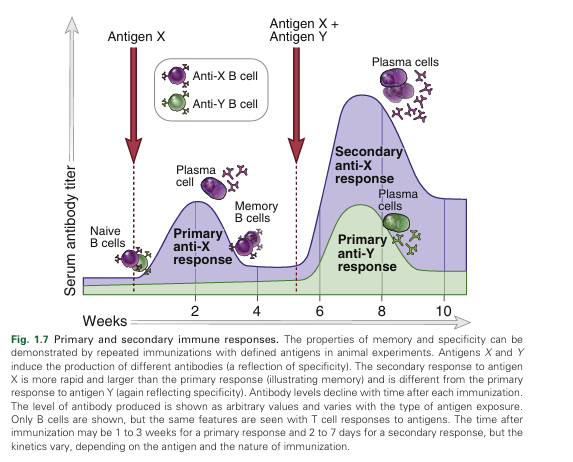


 النبات
النبات
 الحيوان
الحيوان
 الأحياء المجهرية
الأحياء المجهرية
 علم الأمراض
علم الأمراض
 التقانة الإحيائية
التقانة الإحيائية
 التقنية الحيوية المكروبية
التقنية الحيوية المكروبية
 التقنية الحياتية النانوية
التقنية الحياتية النانوية
 علم الأجنة
علم الأجنة
 الأحياء الجزيئي
الأحياء الجزيئي
 علم وظائف الأعضاء
علم وظائف الأعضاء
 الغدد
الغدد
 المضادات الحيوية
المضادات الحيوية|
Read More
Date: 8-12-2020
Date: 8-11-2015
Date: 9-12-2015
|
The adaptive immune system mounts faster, larger and more effective responses to repeated exposure to the same antigen. This feature of adaptive immune responses implies that the immune system remembers every encounter with antigen, and this property of adaptive immunity is therefore called immunologic memory. The response to the first exposure to antigen, called the primary immune response, is initiated by lymphocytes called naive lymphocytes that are seeing antigen for the first time (Fig. 1.7). The term naive refers to these cells being immunologically inexperienced, not having previously responded to antigens.
Subsequent encounters with the same antigen lead to responses called secondary immune responses that usually are more rapid, larger, and better able to eliminate the antigen than primary responses. Secondary responses are the result of the activation of memory lymphocytes, which are long-lived cells that were induced during the primary immune response. Immunologic memory optimizes the ability of the immune system to combat persistent and recurrent infections, because each exposure to a microbe generates more memory cells and activates previously generated memory cells. Immunologic memory is one mechanism by which vaccines confer long-lasting protection against infections.




|
|
|
|
للتخلص من الإمساك.. فاكهة واحدة لها مفعول سحري
|
|
|
|
|
|
|
العلماء ينجحون لأول مرة في إنشاء حبل شوكي بشري وظيفي في المختبر
|
|
|
|
|
|
|
العتبة العباسية تعلن أسماء الفائزين بمسابقة ولادة السيدة فاطمة الزهراء (عليها السلام)
|
|
|